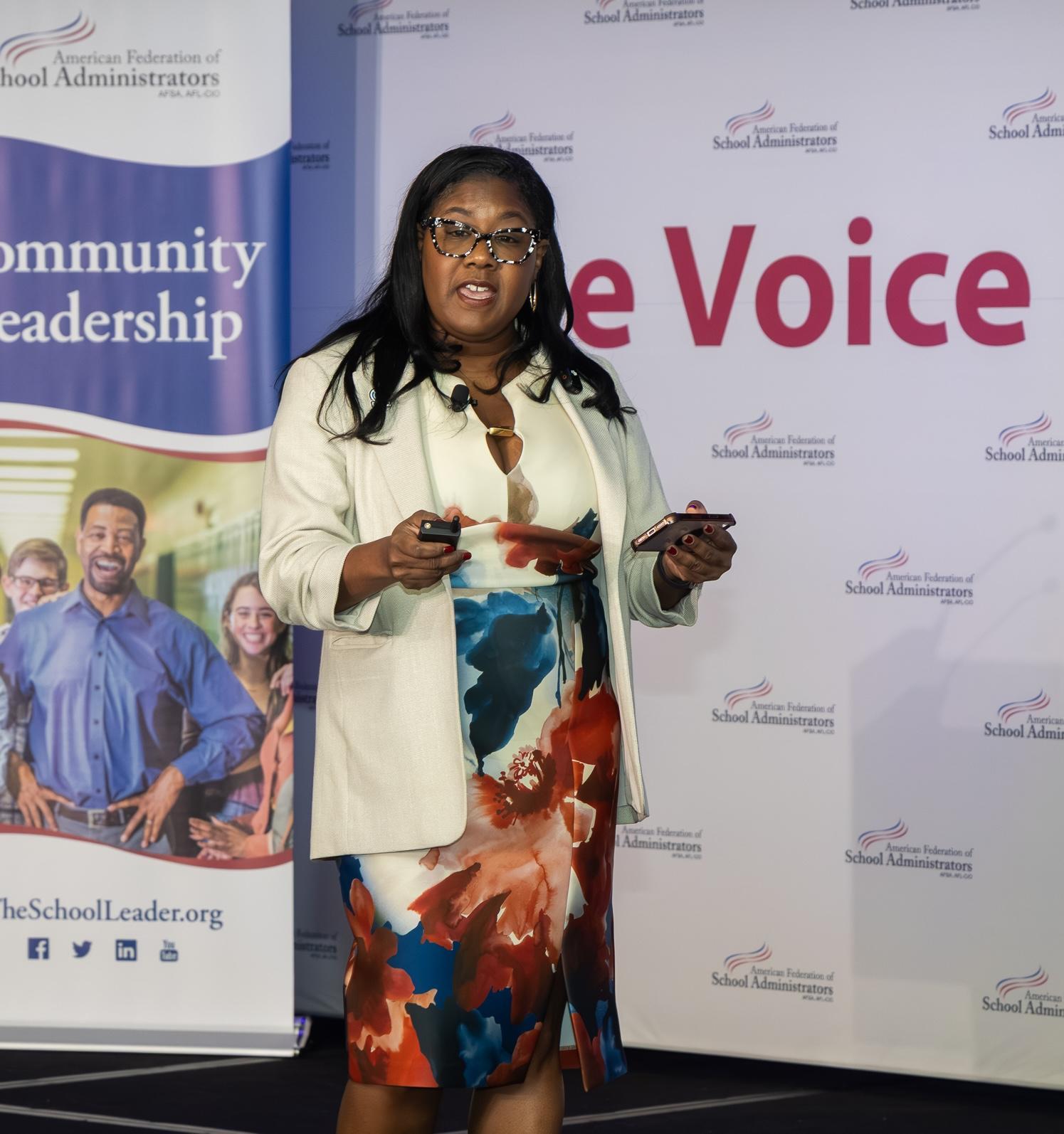Having a vision, organizing from the ground up, holding to a strategy and maintaining an unshakable sense of purpose turned a single voice in Chicago into a coordinated force for school leaders. That was the praise Kia Banks, newly elected president of the Chicago Principals & Administrators Association (CPAA), AFSA Local 2 offered to her predecessor, Troy LaRaviere, who built membership and capacity—doubling the roster from roughly 500 to more than 1,100 members.
Speaking before AFSA delegates, Banks said LaRaviere’s leadership laid the foundation for CPAA’s transformation from a small advocacy group into a powerful voice for principals and administrators. Through sustained outreach, legal expertise and a clear vision, the union grew into an organization capable of shaping legislation, winning rights and preparing to secure its first contract with Chicago Public Schools.
Banks traced her own arc from a reluctant union member—a principal who once joined CPAA because “you might need a lawyer one day”—to a leader who now represents more than 1,100 principals and assistant principals in Chicago. She described moments of humiliation and vulnerability early in her principalship: local school council politics, protests at her building, and even the rescission and later reinstatement of her contract. Those experiences, she said, crystallized why she needed to invest in the union rather than simply rely on it. Banks recalled one particularly raw moment during the pandemic, when her young daughter hid in her office while she tried to run an empty school—a crisis that drove her to reengage with CPAA’s organizing efforts.
Banks credited LaRaviere’s mentorship and CPAA’s sustained partnership with AFSA for both her growth and the union’s transformation.
Under the CPAA organizing strategy, she explained, the union moved from quiet advocacy to legislative and legal wins. Banks highlighted three milestones the local helped secure: a more transparent eligibility process for principals entering Chicago, a 2023 law recognizing principals’ right to bargain and the passage of mandatory interest arbitration in early 2025—legislation that provides a neutral arbitrator if contract disputes cannot be resolved at the bargaining table. These institutional changes, she said, transformed the balance of power with Chicago Public Schools.
Banks outlined CPAA’s strategy around three pillars: educate, listen and turn issues into campaigns. She stressed the importance of communication—a full-color quarterly magazine, social media campaigns, member surveys—and of treating nonmembers not as outsiders but as voices to be engaged. “We turned our problems into campaigns. We linked communication directly to organizing, and we shared what we were doing early and often,” she said.
The legislative push, Banks noted, was anything but simple. She recalled the day the mandatory interest arbitration bill came to a vote, describing the scramble of phone calls and behind-the-scenes pressure from opponents who resisted sharing power. CPAA prevailed, and in January 2025 the law took effect—a change she celebrated as essential to ensuring principals’ voices are heard.
Banks also announced progress at the bargaining table: CPAA is negotiating its first collective bargaining agreement and is close to an initial deal to codify protections and gains for Chicago’s principals and assistant principals. Independent reporting and CPAA materials indicate the two sides reached a tentative agreement in late summer/early fall 2025.
Throughout her remarks, Banks returned to the “why” behind the work. For her, that why is her daughter, Aria, and the kind of education system she wants for the next generation. “When I think about raising the bar, I’m not just thinking about test scores. I’m thinking about the kind of world she’s going to step into,” she said.
She closed with a call to action for AFSA members: ask hard questions, tell your stories, prioritize communication and organizing, and be strategic about both finances and planning. She encouraged leaders to develop one-, three-, five- and 10-year strategic plans—not only to win statutory rights, but to ensure they endure across administrations.
“Consider me your auntie,” Banks said. “I stand with you. And always remember: when your why is tied to the work, you’ll keep moving forward—even when it’s hard.”
